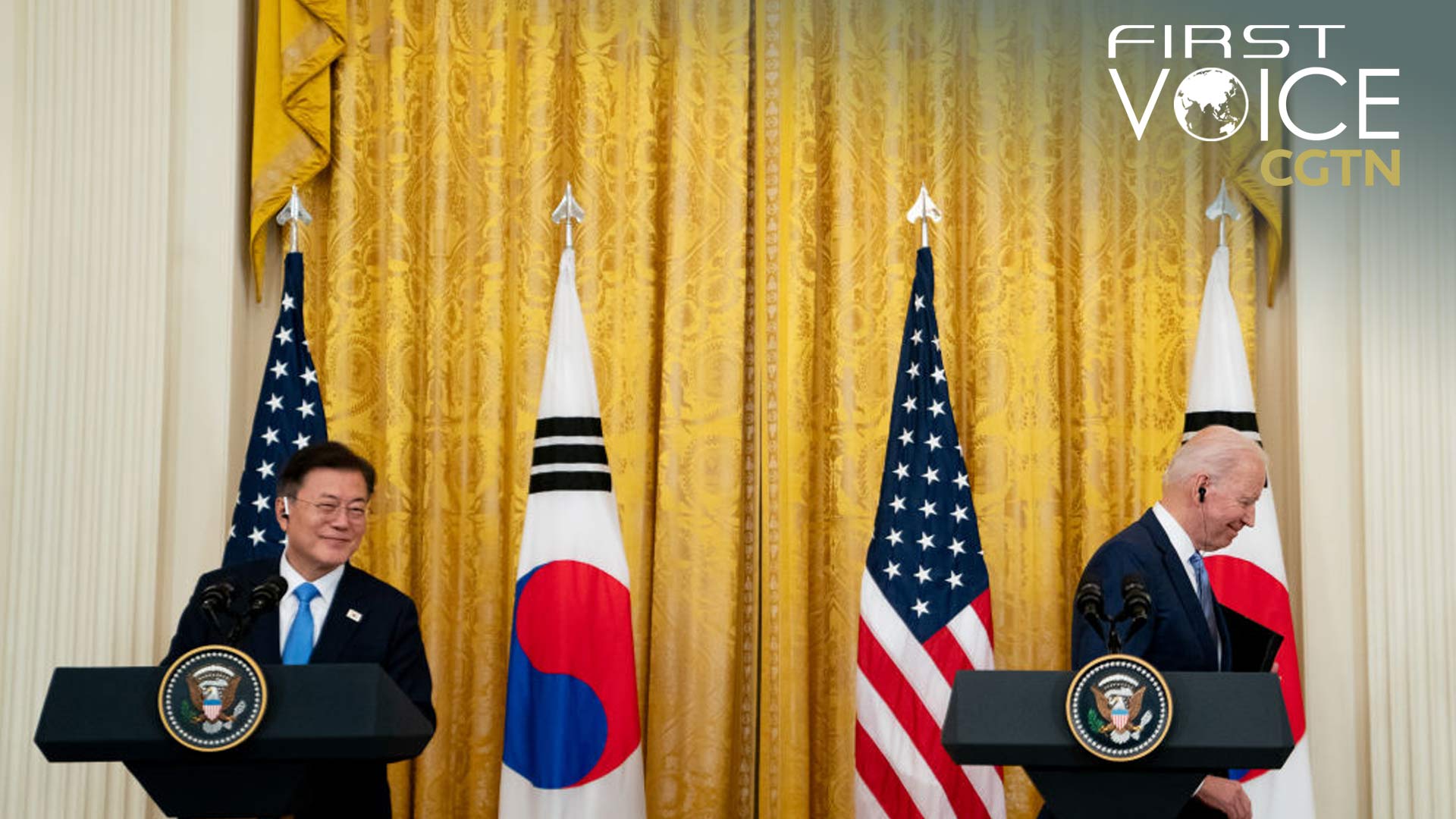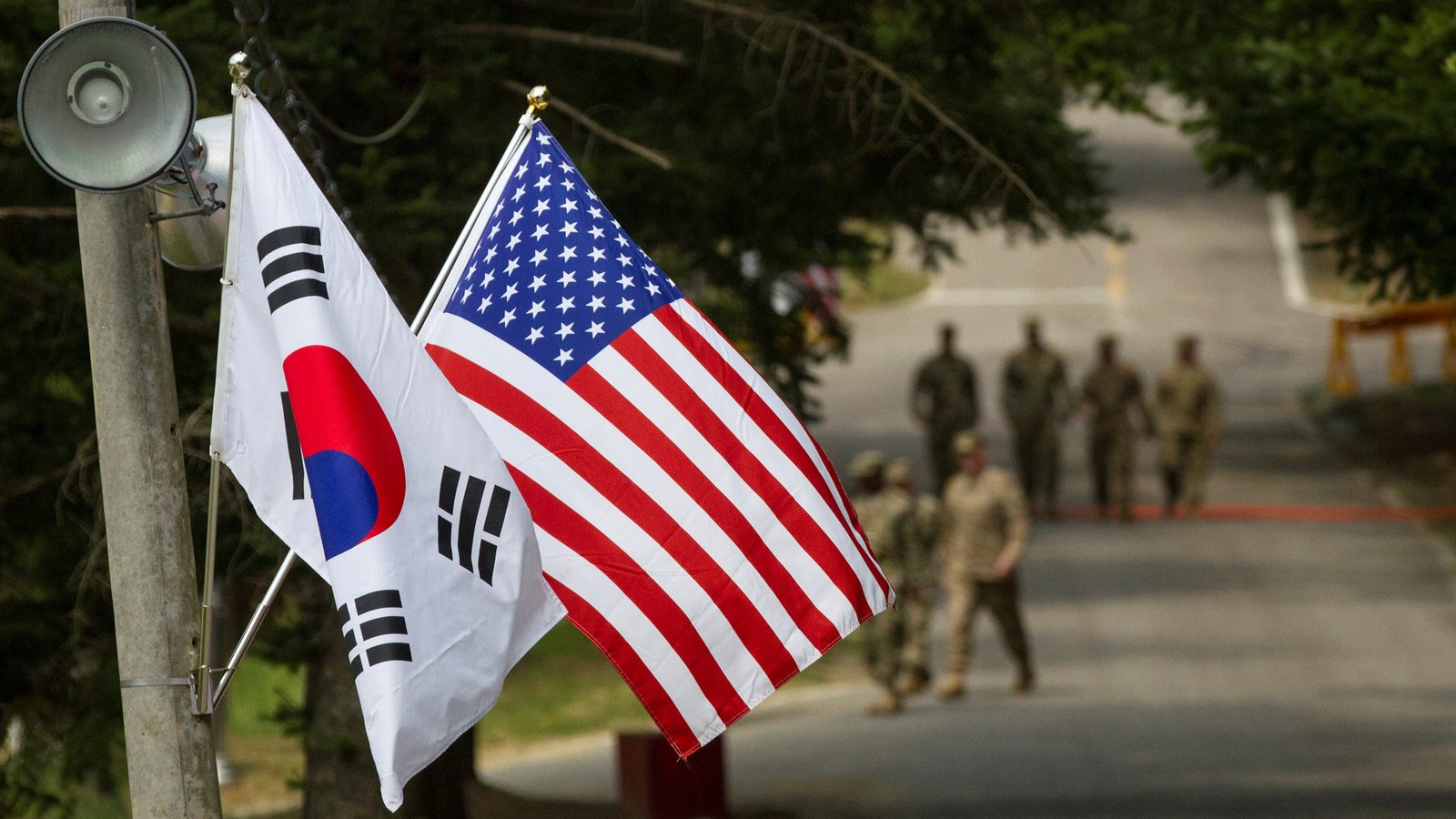
U.S. President Joe Biden (R) and South Korean President Moon Jae-in depart from a news conference in the East Room of the White House in Washington, D.C., U.S., May 21, 2021. /Getty
U.S. President Joe Biden (R) and South Korean President Moon Jae-in depart from a news conference in the East Room of the White House in Washington, D.C., U.S., May 21, 2021. /Getty
Editor's note: CGTN's First Voice provides instant commentary on breaking stories. The daily column clarifies emerging issues and better defines the news agenda, offering a Chinese perspective on the latest global events.
Beijing on Monday warned Washington and Seoul not to play with fire on the Taiwan issue. The move comes after U.S. President Joe Biden and his South Korean counterpart Moon Jae-in mentioned issues related to the Taiwan region and the South China Sea in their joint statement.
South Korea has long been attempting to balance between its top economic trading partner, China, and its top defense ally – the United States. Upsetting either of the two does no good to the country's national interests. The Blue House is clear about it. Thus, despite pressure from Washington, it has been refraining from getting too involved in matters that could touch China's bottom line.
But the U.S., under Biden's presidency, has apparently stepped up its campaign to draw South Korea closer to its side. The joint statement mentioning Taiwan is a warning sign that Seoul may be tilting toward Washington. "Trump may have been too anti-China for Seoul's taste, but Biden's more strategic approach is proving to be much more palatable for Moon," an article from The Diplomat said.

The Republic of Korea's and the United States' flags fly next to each other in Yongin, South Korea. /Reuters
The Republic of Korea's and the United States' flags fly next to each other in Yongin, South Korea. /Reuters
Before dancing to Washington's tune, Seoul may need to think twice about the cost of doing so.
The China-South Korea standoff on deploying the U.S. Terminal High Altitude Area Defense (THAAD) system in 2017 is what the Moon administration may draw a lesson from.
Irrespective of China's concerns that the system poses a threat to its national security and the warnings that the installation could destroy their bilateral ties, South Korea insisted on its deployment. Undoubtedly, the move ended up harming South Korea's own interests.
The country's tourism, retail firms, films and even K-pop stars took a pounding from the upset in Beijing-Seoul relations. South Korean firms also faced resistance from the Chinese market. A halving of inbound Chinese visitors cost South Korea $6.5 billion in lost revenue, according to the Korea Tourism Organization. The total losses resulting from the THAAD standoff were predicted to be $7.5 billion in 2017 alone. That, according to The Diplomat, is a 0.5 percent hit to the country's GDP.
Apart from economic losses, the installation infuriated the South Korean public. A strained relationship with its neighbor is the last thing peace-loving people want to see. After all, it is always the people who have to pay the price for the government's wrong decisions. Public rallies and protests eroded the South Korean government's popularity among its people.
Regarding the Taiwan issue, China has reiterated that it allows no interference in its internal affairs. Any provocation on this matter will for sure invite retaliatory measures from Beijing. Less than five years after the THAAD dispute, the Moon administration needs to think twice about whether it can afford the economic cost and drop in approval rating among its people before colluding with the U.S.
From a geopolitical perspective, South Korea would be unwise to play the Taiwan card either. Washington may promise Seoul some benefits for joining a united front against Beijing. But for the Blue House, a peaceful solution to the Korean Peninsula issue carries more importance for its security. This issue cannot be solved without China's participation. A deteriorated relationship with China means a reduced possibility of solving the Korean Peninsula matter.
Moon stressed earlier that Seoul will help maintain the stability of Beijing-Washington ties. Sound China-U.S. relationship is in the interest of not only South Korea but also the entire region. Staying hands-off on the Taiwan issue would be the first step.
Beijing is willing to improve ties with Washington and welcomes Seoul to play a role in it. It sees no problem with the enhancement of the Seoul-Washington alliance. However, this should be conducive to promoting regional peace and stability, not the opposite. Courting the U.S. at the cost of China will backfire.
Scriptwriter: Liu Jianxi
(If you want to contribute and have specific expertise, please contact us at opinions@cgtn.com.)

